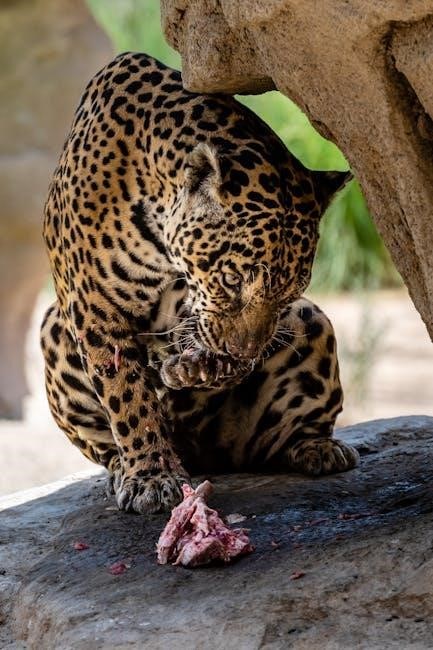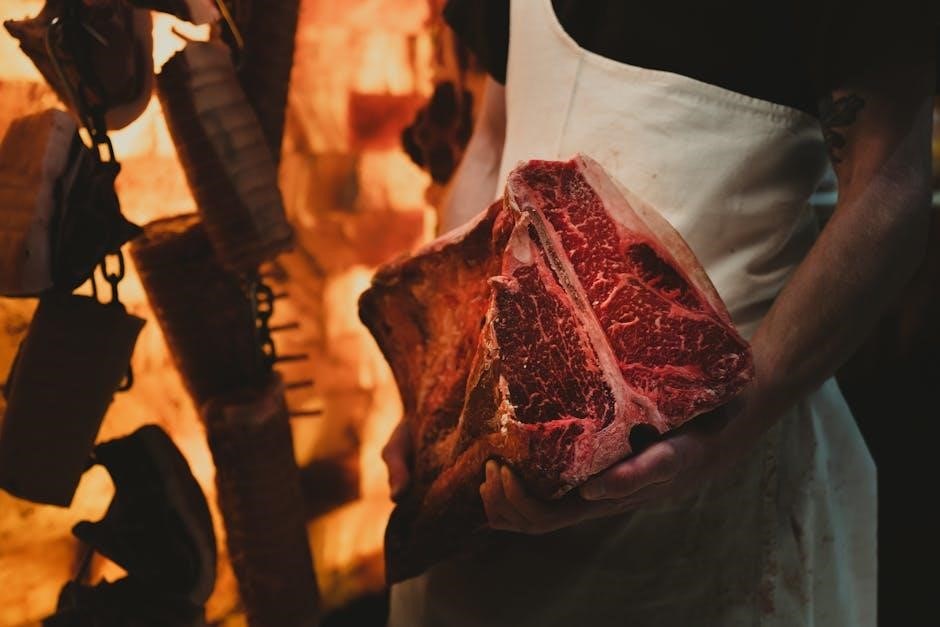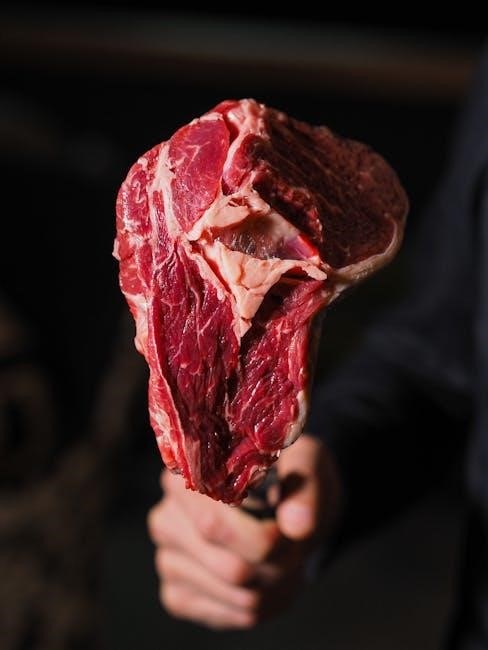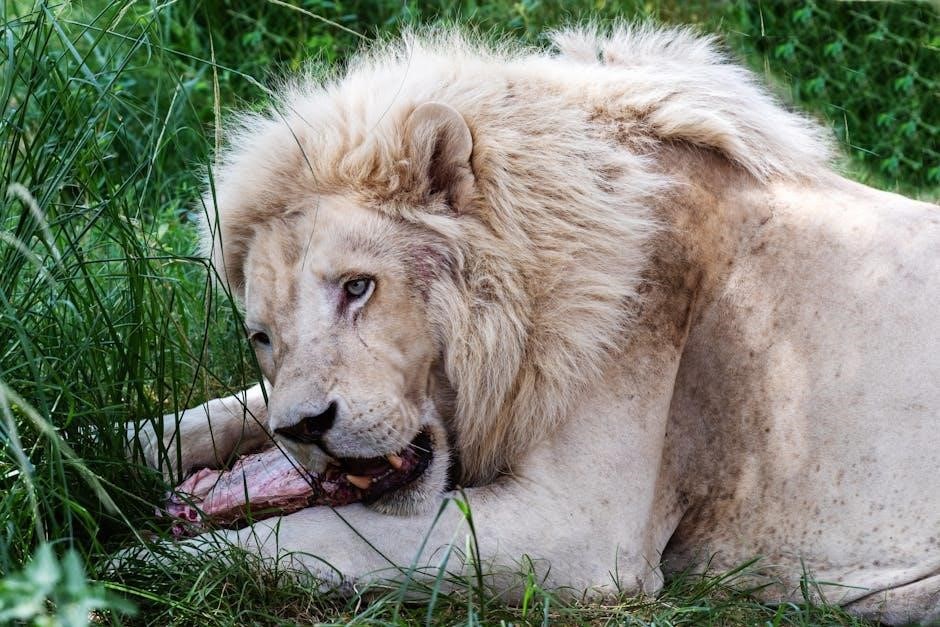carnivore diet pdf
- Published
- in PDF
The carnivore diet is an all-meat‚ animal-based diet excluding plants‚ focusing on animal products like beef‚ poultry‚ and fish. It mimics ancestral eating patterns‚ promoting weight loss and energy‚ while sparking debates on health impacts and nutritional balance. Popularized by guides like The Carnivore Diet Handbook‚ it offers structured approaches for those seeking drastic dietary changes.
What is the Carnivore Diet?

The carnivore diet is an all-meat‚ animal-based diet that excludes all plant foods. It focuses on consuming animal products such as beef‚ poultry‚ eggs‚ and seafood‚ while eliminating fruits‚ vegetables‚ and grains. Proponents argue that it mimics the diet of early humans‚ promoting weight loss‚ improved energy‚ and reduced inflammation. The diet gained popularity through resources like The Carnivore Diet Handbook‚ which provides guidance for transitioning to an all-meat lifestyle. Followers often emphasize the importance of high-quality‚ grass-fed meats and organs for optimal health. While some report significant benefits‚ critics highlight potential risks‚ such as nutritional deficiencies and increased cholesterol levels. The diet remains controversial but has a dedicated following among those seeking drastic dietary changes.
History and Evolution of the Carnivore Diet
The carnivore diet traces its roots to ancestral eating patterns‚ with early humans consuming meat as a primary food source; Modern versions emerged in the early 20th century‚ influenced by Vilhjalmur Stefansson’s Arctic explorations‚ where he thrived on an all-meat diet. The concept gained momentum in the 2000s‚ popularized by figures like Dr. Shawn Baker‚ who advocated for a meat-only lifestyle. The diet has since evolved‚ with resources like The Carnivore Diet Handbook providing structured guides. It has become a niche movement‚ often linked to ketogenic diets‚ while sparking debates about its long-term health implications. Despite criticism‚ the diet continues to attract those seeking radical dietary changes for health and performance.

Key Principles of the Carnivore Diet
The carnivore diet centers on consuming solely animal products‚ excluding all plant-based foods. Key principles include prioritizing high-quality meats like grass-fed beef‚ poultry‚ and fish‚ while minimizing processed foods. Advocates emphasize the importance of eliminating carbohydrates and sugars to induce a metabolic state akin to ketosis. Hydration and electrolyte balance are also stressed to avoid common pitfalls like dehydration. The diet encourages listeners to tune into their bodies‚ viewing challenges like carb withdrawal as signs of adaptation. Resources such as The Carnivore Diet Handbook provide detailed guidelines‚ while proponents argue that this approach optimizes health by aligning with evolutionary dietary habits. The focus is on simplicity and nutrient-dense foods for long-term well-being.
Benefits of the Carnivore Diet
The carnivore diet promotes weight loss‚ improved body composition‚ and enhanced energy levels. It reduces inflammation‚ improves digestion‚ and enhances mental clarity‚ as reported by many practitioners.
Weight Loss and Improved Body Composition
The carnivore diet has gained attention for its potential to promote significant weight loss and improve body composition. By focusing on high-protein‚ high-fat animal products‚ the diet often leads to a reduction in body fat while preserving or even increasing muscle mass. Many practitioners report feeling more satiated due to the diet’s emphasis on nutrient-dense foods‚ which can naturally reduce overall calorie intake. Additionally‚ the elimination of carbohydrates can lead to a reduction in water retention‚ further contributing to weight loss. Some individuals also note improved energy levels‚ which may be attributed to the body’s adaptation to burning fat for fuel. However‚ it’s important to consider that initial weight loss may also be due to water loss rather than fat loss alone. Balancing the diet with adequate variety and monitoring progress is crucial for sustained benefits.
Enhanced Energy Levels
Many individuals on the carnivore diet report experiencing enhanced energy levels‚ which they attribute to the diet’s focus on high-quality animal products. The absence of carbohydrates can lead to a reduction in energy crashes typically associated with sugar intake. Instead‚ the body adapts to utilizing fat for fuel‚ which can provide a more stable and sustained energy source. Some practitioners also note improved mental clarity and focus‚ which may contribute to the perception of increased energy. However‚ it’s important to consider that initial transitions to the diet might include short-term fatigue or “keto flu” symptoms‚ which often subside as the body adapts. Overall‚ the carnivore diet’s emphasis on nutrient-dense foods can support long-term energy stability and vitality.
Reduced Inflammation and Improved Digestion
The carnivore diet often leads to reduced inflammation and improved digestion for many practitioners. By eliminating plants‚ which can contain inflammatory compounds like lectins and phytotoxins‚ the body may experience less irritation and inflammation. Additionally‚ the diet’s focus on high-quality animal fats and proteins can support gut health‚ reducing symptoms of bloating and digestive discomfort. Some individuals report improved absorption of nutrients‚ as the diet avoids fiber‚ which can sometimes interfere with nutrient uptake. Furthermore‚ the simplicity of the diet—centered on meat and animal products—can reduce digestive strain‚ allowing the body to function more efficiently. Overall‚ many find that the carnivore diet promotes a more balanced and less inflamed digestive system‚ contributing to overall well-being.
Improved Mental Clarity and Focus
Many carnivore diet practitioners report enhanced mental clarity and focus. The diet’s emphasis on eliminating carbohydrates and sugars can stabilize blood sugar levels‚ reducing cognitive fluctuations. High-quality animal fats provide a steady energy source for the brain‚ promoting sustained concentration. Additionally‚ the diet’s simplicity reduces decision fatigue‚ allowing individuals to maintain mental focus. Some users also attribute their improved mental state to the elimination of plant-based irritants‚ which may contribute to brain fog. The diet’s alignment with ketogenic principles further supports mental acuity‚ as ketones are a potent brain fuel. Overall‚ the carnivore diet appears to enhance cognitive function‚ aiding individuals in maintaining sharp focus and mental clarity throughout the day.

Potential Risks and Challenges
The carnivore diet may lead to increased cholesterol levels‚ nutritional deficiencies‚ and social challenges. Critics highlight risks like heart health concerns and potential negative impacts on gut health.
Nutritional Deficiencies
The carnivore diet may lead to nutritional deficiencies due to the absence of plant-based foods. Fiber‚ vitamins like C and D‚ and minerals such as calcium and magnesium may be lacking. Without fruits and vegetables‚ essential micronutrients are missed‚ potentially causing long-term health issues. Supplements are often recommended to address these gaps. Critics argue that relying solely on animal products can create imbalances‚ especially in fiber and antioxidants. Over time‚ this could contribute to chronic conditions like osteoporosis or weakened immunity. While some followers emphasize the diet’s benefits‚ others caution against ignoring the importance of a varied nutrient intake. Proper planning and supplementation are crucial to mitigate these risks and ensure overall health. The diet’s restrictive nature requires careful attention to avoid deficiencies.
Increased Cholesterol Levels
The carnivore diet often raises concerns about increased cholesterol levels due to its high intake of animal fats. Animal-based foods‚ particularly red meat‚ are rich in saturated fats‚ which can elevate LDL cholesterol. Critics argue that prolonged consumption may heighten cardiovascular risks. However‚ some followers report improved lipid profiles‚ with increased HDL cholesterol and reduced triglycerides. The diet’s impact on cholesterol varies among individuals‚ as genetic and metabolic factors influence outcomes. While some experts warn of potential heart health risks‚ others highlight the diet’s ability to enhance fat metabolism. Monitoring cholesterol levels and overall cardiovascular health is essential for those adopting this diet long-term. The debate remains ongoing‚ with both sides presenting evidence from personal experiences and scientific studies.
Social and Cultural Challenges
The carnivore diet often faces social and cultural resistance due to its restrictive nature. Many societies emphasize plant-based or varied diets‚ making it difficult for carnivore dieters to fit in. Social gatherings‚ meals with family‚ and dining out can become challenging‚ as the diet’s focus on meat and animal products may draw criticism or confusion. Additionally‚ the diet’s association with extreme or unconventional eating habits can lead to judgment or misunderstanding. Some followers report feeling isolated or ostracized‚ particularly in cultures that value diverse culinary traditions; However‚ others find empowerment in challenging societal norms and embracing a diet that aligns with their personal beliefs. The tension between personal choice and cultural expectations remains a significant hurdle for many adherents.

Potential Impact on Gut Health
The carnivore diet’s impact on gut health is a topic of debate. Proponents argue that eliminating plants reduces gut inflammation and improves digestion for some individuals‚ particularly those with conditions like IBD. However‚ critics warn that a lack of fiber from plants may disrupt gut microbiota‚ potentially leading to issues like constipation or impaired immune function. Some adherents report improved digestion and reduced symptoms of digestive disorders‚ while others may experience initial challenges like headaches or fatigue. The diet’s long-term effects on gut health remain unclear‚ as scientific studies are limited. Balancing gut health on a carnivore diet may require careful attention to food quality and hydration‚ though individual experiences vary widely.

How to Implement the Carnivore Diet
Start by eliminating plant-based foods‚ focusing solely on animal products like meat‚ poultry‚ and fish. Stay hydrated‚ monitor electrolyte balance‚ and consider supplements to support transition and long-term adherence.

Essential Foods to Include
The carnivore diet revolves around animal-based foods. Focus on red meats like beef and lamb‚ poultry such as chicken and duck‚ and fish or seafood. Eggs are also a staple. Opt for organ meats like liver or kidneys for added nutrients. Dairy products‚ such as cheese or butter‚ can be included if tolerated. Prioritize grass-fed‚ pasture-raised‚ or wild-caught options for higher quality. Stay hydrated with water‚ and consider bone broth for electrolytes. Avoid plant-based foods entirely‚ ensuring a diet rich in protein and fats from animal sources. This approach aligns with ancestral eating patterns‚ emphasizing whole‚ nutrient-dense foods to support overall health and energy levels. Proper food selection is crucial for maximizing benefits and minimizing potential challenges.
Supplements and Additives
While the carnivore diet focuses on whole animal foods‚ certain supplements and additives can support optimal health. Many practitioners emphasize the importance of electrolytes‚ particularly sodium‚ to maintain proper hydration and prevent muscle cramps. Salt is often recommended to replenish lost electrolytes. Some advocates suggest adding bone broth for additional minerals and collagen. Supplements like vitamin C or fiber may be considered to address potential deficiencies‚ though debate exists on their necessity. Others recommend omega-3 fatty acids from fish or cod liver oil to enhance heart and brain health. Digestive aids‚ such as ox bile‚ may help with fat digestion in those transitioning to the diet. Always consult a healthcare provider before adding supplements to ensure they align with individual needs and goals.
Hydration and Electrolyte Balance
Hydration and electrolyte balance are critical on the carnivore diet‚ as the absence of plant-based foods can alter fluid and mineral dynamics. Drinking plenty of water is essential‚ but many advocates recommend monitoring urine color to ensure proper hydration. Electrolytes‚ particularly sodium‚ potassium‚ and magnesium‚ play a vital role in maintaining cellular function and preventing muscle cramps or fatigue. Some practitioners suggest adding unrefined salt to meals or water to replenish sodium levels. Additionally‚ organ meats and certain cuts of beef naturally contain potassium‚ while magnesium can be found in red meat and fatty fish. Proper electrolyte balance is crucial for energy levels and overall health‚ so careful attention to these nutrients is recommended‚ especially during the initial adaptation phase.
Tips for Sticking to the Diet Long-Term
Sticking to the carnivore diet long-term requires commitment and strategic planning. Start by building a strong mindset‚ as the diet’s restrictiveness can be challenging socially and culturally. Plan meals in advance to avoid last-minute decisions that may derail your progress. Incorporate variety in your protein sources to keep the diet interesting and ensure nutritional balance. Track your progress‚ including weight‚ energy levels‚ and health markers‚ to stay motivated and informed. Surround yourself with a supportive community‚ as shared experiences can enhance adherence. Listen to your body and make adjustments as needed to maintain optimal health. Celebrate milestones to reinforce your commitment‚ and consider consulting a healthcare provider for personalized guidance to ensure long-term success and safety on the carnivore diet.
Expert Opinions and Case Studies
Physiologists like Bart Kay discuss the carnivore diet’s impact on cholesterol and stem cells‚ while Dr. Justin Trosclair shares insights on HIIT training and diet benefits. Case studies highlight individuals like physicist Steve Omohundro‚ who credited the diet with aiding post-cancer recovery‚ showcasing its transformative potential for specific health conditions.
Interviews with Physiologists and Nutritionists
Physiologists like Bart Kay and nutritionists have shared insights on the carnivore diet‚ discussing its effects on cholesterol‚ inflammation‚ and energy levels. Kay highlights how the diet can debunk common cholesterol myths and promote cellular health through practices like HIIT training. Nutritionists‚ however‚ often express concerns about potential nutritional deficiencies and the long-term impact on gut health. Some experts emphasize the importance of personalization‚ noting that while the diet may benefit certain individuals‚ it may not be suitable for everyone. These interviews provide a balanced perspective‚ blending scientific observations with practical advice for those considering or following the carnivore diet.
Success Stories from Carnivore Diet Practitioners

Many practitioners of the carnivore diet report transformative experiences‚ such as significant weight loss and improved energy levels. One individual shared their journey‚ stating they felt “weightless and light” after adopting the diet‚ describing it as a discovery of their true self. Others‚ like physicist Steve Omohundro‚ credit the diet with aiding recovery after serious health challenges. These success stories often highlight the diet’s ability to simplify nutrition and reduce inflammation. While results vary‚ testimonials frequently emphasize enhanced mental clarity and overall well-being. Such accounts inspire curiosity and exploration of the carnivore diet‚ though individual experiences may differ. Those considering the diet often find these stories motivating‚ encouraging them to explore its potential benefits firsthand.
Scientific Studies on the Carnivore Diet

Scientific studies on the carnivore diet are limited but growing‚ with research exploring its effects on weight loss‚ blood markers‚ and overall health. Some studies suggest that the diet may lead to significant weight loss and improvements in cholesterol and blood sugar levels. However‚ concerns about long-term nutritional deficiencies and impacts on gut health remain. A few studies have highlighted the diet’s potential to reduce inflammation and improve mental clarity‚ though these findings are not yet widely replicated. While anecdotal evidence abounds‚ more rigorous‚ long-term research is needed to fully understand the diet’s benefits and risks. Current studies emphasize the importance of careful planning to minimize potential drawbacks‚ such as low fiber intake and high saturated fat consumption. As research evolves‚ the carnivore diet remains a topic of interest and debate in the scientific community.

Comparison with Other Diets
The carnivore diet contrasts sharply with vegan and ketogenic diets‚ focusing solely on animal products. Unlike keto‚ it eliminates even low-carb plants‚ while vegan avoids all animal foods. This strict approach sets it apart‚ emphasizing meat as the primary source of nutrition‚ similar to but more extreme than the ketogenic diet. Such comparisons highlight its unique stance in dietary preferences and restrictions‚ catering to those seeking a highly specialized eating plan. The carnivore diet’s restrictive nature makes it a subject of both interest and criticism in dietary discussions. Its focus on animal-based nutrition distinguishes it from other popular diets‚ offering a distinct approach to health and weight management. This comparison underscores the diet’s niche appeal and potential benefits for specific individuals. The carnivore diet stands out for its elimination of plant-based foods‚ making it a radical choice in the spectrum of modern diets. Its similarities and differences with other diets are key points of discussion among nutritionists and enthusiasts alike. The carnivore diet’s comparison with other diets reveals its unique benefits and drawbacks‚ providing a clearer understanding of its suitability for different lifestyles and health goals. By examining how it aligns with or diverges from other dietary approaches‚ individuals can better assess its potential fit within their own nutritional strategies. The carnivore diet’s place within the broader dietary landscape is defined by its extreme focus on animal products‚ setting it apart from more balanced or plant-centric diets. This comparison aids in evaluating its effectiveness and appropriateness for various individuals seeking specific health outcomes. The carnivore diet’s distinct characteristics make it a notable option for those willing to adopt a highly specialized eating plan. Through comparison‚ its advantages and challenges become clearer‚ helping individuals make informed decisions about their dietary choices. The carnivore diet’s comparison with other diets provides valuable insights into its potential benefits and limitations‚ aiding those considering this unique approach to nutrition. By understanding where it stands among other diets‚ individuals can better determine if the carnivore diet aligns with their health objectives and lifestyle preferences. The carnivore diet’s position in the dietary spectrum is characterized by its exclusivity‚ making it a subject of interest for those exploring extreme dietary options. This comparison highlights its niche appeal and the specific scenarios where it may be most beneficial or detrimental. The carnivore diet’s unique characteristics set it apart from other diets‚ offering a distinct set of advantages and challenges that warrant careful consideration. Through this comparison‚ its role in the broader context of nutrition becomes evident‚ helping individuals evaluate its suitability for their personal health journey. The carnivore diet’s comparison with other diets underscores its radical approach‚ emphasizing the importance of a well-informed decision for those contemplating its adoption. By examining its similarities and differences‚ individuals can better navigate the potential outcomes of embracing such a specialized diet. The carnivore diet’s place among other diets is defined by its exclusivity and focus‚ making it a subject of both intrigue and caution in the nutritional community. This comparison serves as a tool for evaluating its alignment with individual health goals and dietary preferences. The carnivore diet’s unique position in the dietary landscape is marked by its strict adherence to animal-based nutrition‚ offering a distinct option for those seeking significant changes in their eating habits. Through comparison‚ its potential benefits and drawbacks are illuminated‚ guiding individuals in making informed choices about their nutritional path. The carnivore diet’s comparison with other diets highlights its niche appeal and the need for careful consideration before adoption. By understanding its place within the broader spectrum of dietary options‚ individuals can assess its suitability for their specific health and lifestyle needs. The carnivore diet’s distinct characteristics make it a subject of interest for those exploring extreme dietary approaches‚ with its comparison to other diets providing crucial insights into its potential effectiveness and suitability. This analysis aids in evaluating whether the carnivore diet aligns with personal health objectives and dietary preferences‚ ensuring that individuals make well-informed decisions about their nutritional strategies. The carnivore diet’s position among other diets is characterized by its extreme focus on animal products‚ offering a unique option for those willing to adopt a highly specialized eating plan. Through comparison‚ its advantages and challenges become evident‚ helping individuals determine its appropriateness for their health goals and lifestyle. The carnivore diet’s comparison with other diets reveals its unique benefits and drawbacks‚ providing a clearer understanding of its potential fit within individual nutritional plans. By examining how it aligns with or diverges from other dietary approaches‚ individuals can better assess its suitability for their specific needs and preferences. The carnivore diet’s place within the broader dietary landscape is defined by its exclusivity‚ making it a notable option for those seeking a radical change in their eating habits. This comparison aids in evaluating its effectiveness and appropriateness‚ helping individuals make informed decisions about their dietary choices. The carnivore diet’s distinct characteristics set it apart from other diets‚ offering a distinct set of advantages and challenges that warrant careful consideration. Through this comparison‚ its role in the broader context of nutrition becomes evident‚ helping individuals evaluate its suitability for their personal health journey. The carnivore diet’s comparison with other diets underscores its radical approach‚ emphasizing the importance of a well-informed decision for those contemplating its adoption. By examining its similarities and differences‚ individuals can better navigate the potential outcomes of embracing such a specialized diet. The carnivore diet’s place among other diets is defined by its exclusivity and focus‚ making it a subject of both intrigue and caution in the nutritional community. This comparison serves as a tool for evaluating its alignment with individual health goals and dietary preferences. The carnivore diet’s unique position in the dietary landscape is marked by its strict adherence to animal-based nutrition‚ offering a distinct option for those seeking significant changes in their eating habits. Through comparison‚ its potential benefits and drawbacks are illuminated‚ guiding individuals in making informed choices about their nutritional path. The carnivore diet’s comparison with other diets highlights its niche appeal and the need for careful consideration before adoption. By understanding its place within the broader spectrum of dietary options‚ individuals can assess its suitability for their specific health and lifestyle needs. The carnivore diet’s distinct characteristics make it a subject of interest for those exploring extreme dietary approaches‚ with its comparison to other diets providing crucial insights into its potential effectiveness and suitability. This analysis aids in evaluating whether the carnivore diet aligns with personal health objectives and dietary preferences‚ ensuring that individuals make well-informed decisions about their nutritional strategies; The carnivore diet’s position among other diets is characterized by its extreme focus on animal products‚ offering a unique option for those willing to adopt a highly specialized eating plan. Through comparison‚ its advantages and challenges become evident‚ helping individuals determine its appropriateness for their health goals and lifestyle. The carnivore diet’s comparison with other diets reveals its unique benefits and drawbacks‚ providing a clearer understanding of its potential fit within individual nutritional plans. By examining how it aligns with or diverges from other dietary approaches‚ individuals can better assess its suitability for their specific needs and preferences. The carnivore diet’s place within the broader dietary landscape is defined by its exclusivity‚ making it a notable option for those seeking a radical change in their eating habits. This comparison aids in evaluating its effectiveness and appropriateness‚ helping individuals make informed decisions about their dietary choices. The carnivore diet’s distinct characteristics set it apart from other diets‚ offering a distinct set of advantages and challenges that warrant careful consideration. Through this comparison‚ its role in the broader context of nutrition becomes evident‚ helping individuals evaluate its suitability for their personal health journey. The carnivore diet’s comparison with other diets underscores its radical approach‚ emphasizing the importance of a well-informed decision for those contemplating its adoption. By examining its similarities and differences‚ individuals can better navigate the potential outcomes of embracing such a specialized diet. The carnivore diet’s place among other diets is defined by its exclusivity and focus‚ making it a subject of both intrigue and caution in the nutritional community. This comparison serves as a tool for evaluating its alignment with individual health goals and dietary preferences. The carnivore diet’s unique position in the dietary landscape is marked by its strict adherence to animal-based nutrition‚ offering a distinct option for those seeking significant changes in their eating habits. Through comparison‚ its potential benefits and drawbacks are illuminated‚ guiding individuals in making informed choices about their nutritional path. The carnivore diet’s comparison with other diets highlights its niche appeal and the need for careful consideration before adoption. By understanding its place within the broader spectrum of dietary options‚ individuals can assess its suitability for their specific health and lifestyle needs. The carnivore diet’s distinct characteristics make it a subject of interest for those exploring extreme dietary approaches‚ with its comparison to other diets providing crucial insights into its potential effectiveness and suitability. This analysis aids in evaluating whether the carnivore diet aligns with personal health objectives and dietary preferences‚ ensuring that individuals make well-informed decisions about their nutritional strategies. The carnivore diet’s position among other diets is characterized by its extreme focus on animal products‚ offering a unique option for those willing to adopt a highly specialized eating plan. Through comparison‚ its advantages and challenges become evident‚ helping individuals determine its appropriateness for their health goals and lifestyle. The carnivore diet’s comparison with other diets reveals its unique benefits and drawbacks‚ providing a clearer understanding of its potential fit within individual nutritional plans. By examining how it aligns with or diverges from other dietary approaches‚ individuals can better assess its suitability for their specific needs and preferences. The carnivore diet’s place within the broader dietary landscape is defined by its exclusivity‚ making it a notable option for those seeking a radical change in their eating habits. This comparison aids in evaluating its effectiveness and appropriateness‚ helping individuals make informed decisions about their dietary choices. The carnivore diet’s distinct characteristics set it apart from other diets‚ offering a distinct set of advantages and challenges that warrant careful consideration. Through this comparison‚ its role in the broader context of nutrition becomes evident‚ helping individuals evaluate its suitability for their personal health journey. The carnivore diet’s comparison with other diets underscores its radical approach‚ emphasizing the importance of a well-informed decision for those contemplating its adoption. By examining its similarities and differences‚ individuals can better navigate
Ketogenic Diet vs. Carnivore Diet
The ketogenic diet and the carnivore diet share similarities but differ in scope. The ketogenic diet focuses on high fat‚ moderate protein‚ and low carbohydrate intake to enter ketosis‚ while the carnivore diet excludes all plants‚ emphasizing only animal products. Both diets aim for weight loss and improved energy but approach nutrition differently. The carnivore diet is more restrictive‚ eliminating even low-carb plants‚ whereas keto allows some plant-based foods. The carnivore diet is often seen as the “far end” of keto‚ with a stricter focus on animal-based nutrition. While keto is more flexible and widely studied‚ the carnivore diet is more extreme‚ appealing to those seeking a radical dietary change. Both diets have potential benefits but also carry risks‚ such as nutritional deficiencies or increased cholesterol‚ making them controversial choices in the dietary landscape.
OMAD (One Meal a Day) and Carnivore Diet
OMAD (One Meal a Day) and the carnivore diet often overlap‚ as both emphasize simplicity and restriction. OMAD involves eating one meal daily‚ aligning with the carnivore diet’s focus on animal-based foods. This combination can enhance fat adaptation and simplify eating patterns. Many carnivore dieters adopt OMAD naturally‚ as it reduces decision fatigue and aligns with their dietary restrictions. However‚ combining OMAD with a carnivore diet requires careful attention to hydration‚ electrolyte balance‚ and nutrient density. Proponents argue it amplifies weight loss and energy levels‚ while critics warn of potential nutritional gaps. For those seeking extreme dietary simplicity‚ this pairing offers a structured approach to achieving metabolic and digestive goals. It remains a niche but growing trend within low-carb and carnivore communities. Proper planning is essential to avoid deficiencies.
and Final Thoughts
Vegan Diet vs. Carnivore Diet
The vegan and carnivore diets represent opposite extremes in dietary philosophy. Vegans consume only plant-based foods‚ avoiding all animal products for ethical‚ environmental‚ and health reasons. In contrast‚ the carnivore diet focuses solely on animal-based foods‚ excluding plants entirely. While vegans emphasize variety and nutrient diversity from fruits‚ vegetables‚ and grains‚ carnivore dieters argue that animal products provide all necessary nutrients for optimal health. Both diets aim to promote health and well-being but differ fundamentally in their approaches. Vegans often highlight environmental sustainability‚ while carnivore advocates focus on weight loss‚ energy‚ and reduced inflammation. Despite their differences‚ both diets require careful planning to avoid nutritional deficiencies. The choice between them often reflects deeper values and lifestyle priorities.;
